新概念第一册第85、86课
- 格式:ppt
- 大小:2.72 MB
- 文档页数:27
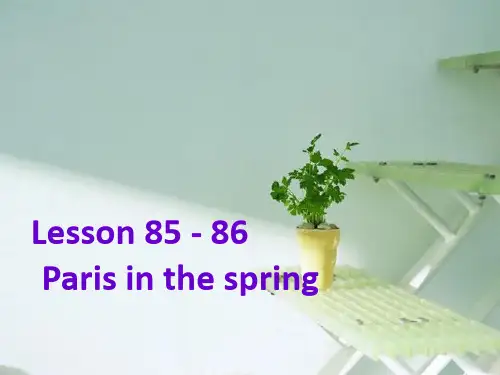
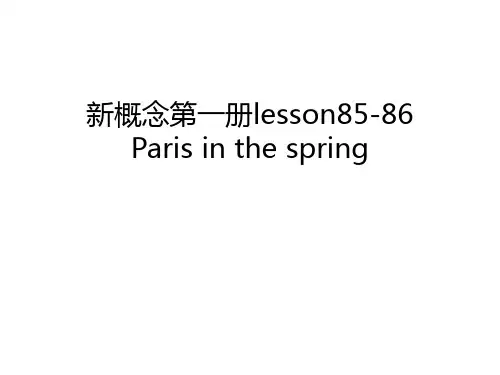
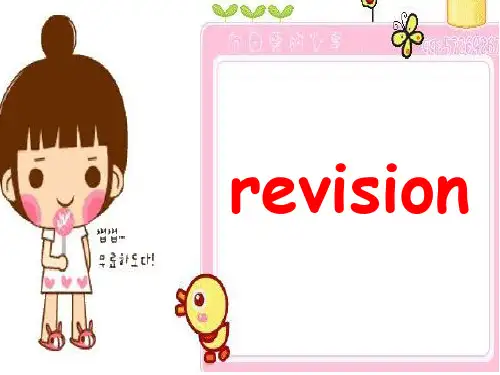
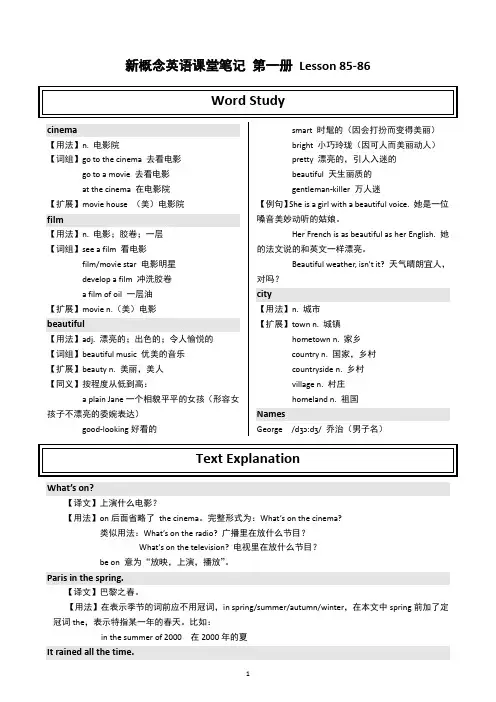
新概念英语课堂笔记第一册Lesson 85-86cinema【用法】n. 电影院【词组】go to the cinema 去看电影go to a movie 去看电影at the cinema 在电影院【扩展】movie house (美)电影院film【用法】n. 电影;胶卷;一层【词组】see a film 看电影film/movie star 电影明星develop a film 冲洗胶卷a film of oil 一层油【扩展】movie n.(美)电影beautiful【用法】adj. 漂亮的;出色的;令人愉悦的【词组】beautiful music 优美的音乐【扩展】beauty n. 美丽,美人【同义】按程度从低到高:a plain Jane一个相貌平平的女孩(形容女孩子不漂亮的委婉表达)good-looking好看的smart 时髦的(因会打扮而变得美丽)bright 小巧玲珑(因可人而美丽动人)pretty 漂亮的,引人入迷的beautiful 天生丽质的gentleman-killer 万人迷【例句】She is a girl with a beautiful voice. 她是一位嗓音美妙动听的姑娘。
Her French is as beautiful as her English. 她的法文说的和英文一样漂亮。
Beautiful weather, isn't it? 天气晴朗宜人,对吗?city【用法】n. 城市【扩展】town n. 城镇hometown n. 家乡country n. 国家,乡村countryside n. 乡村village n. 村庄homeland n. 祖国NamesGeorge /dʒɔ:dʒ/ 乔治(男子名)What’s on?【译文】上演什么电影?【用法】on后面省略了the cinema。
完整形式为:What’s on the cinema?类似用法:What’s on the radio? 广播里在放什么节目?What's on the television? 电视里在放什么节目?be on 意为“放映,上演,播放”。
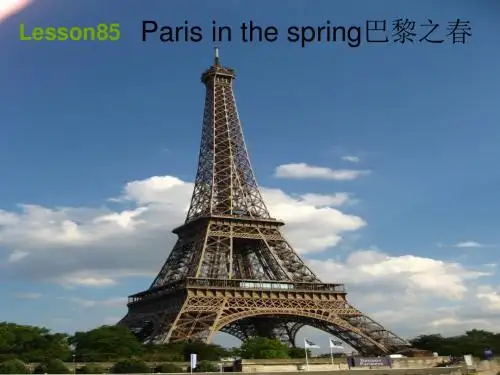
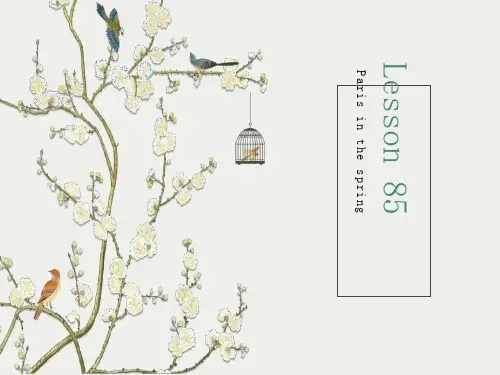
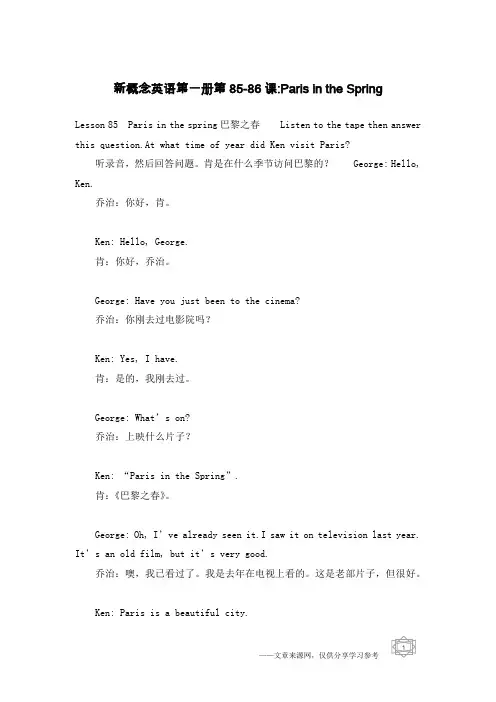
新概念英语第一册第85-86课:Paris in the SpringLesson 85 Paris in the spring巴黎之春Listen to the tape then answer this question.At what time of year did Ken visit Paris?听录音,然后回答问题。
肯是在什么季节访问巴黎的?George: Hello, Ken.乔治:你好,肯。
Ken: Hello, George.肯:你好,乔治。
George: Have you just been to the cinema?乔治:你刚去过电影院吗?Ken: Yes, I have.肯:是的,我刚去过。
George: What’s on?乔治:上映什么片子?Ken: “Paris in the Spring”.肯:《巴黎之春》。
George: Oh, I’ve already seen it.I saw it on television last year. It’s an old film, but it’s very good.乔治:噢,我已看过了。
我是去年在电视上看的。
这是老部片子,但很好。
Ken: Paris is a beautiful city.肯:巴黎是座美丽的城市。
George: I have never been there. Have you ever been there, Ken? 乔治:我从未去过。
肯,你去过吗?Ken: Yes, I have. I was there in April.肯:是的,我去过。
4月份我在那儿。
George: Paris in the spring, eh?乔治:那是巴黎之春,是吗?Ken: It was spring, but the weather was awful. It rained all the time. 肯:是春天,但天气太糟了。
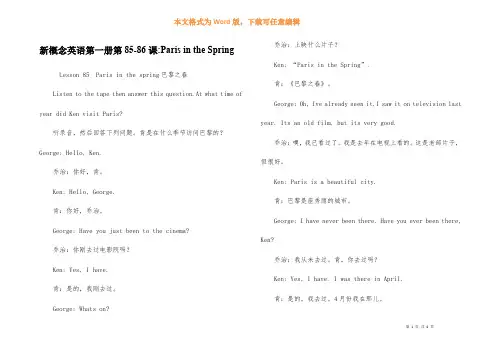
新概念英语第一册第85-86课:Paris in the Spring Lesson 85 Paris in the spring巴黎之春Listen to the tape then answer this question.At what time of year did Ken visit Paris?听录音,然后回答下列问题。
肯是在什么季节访问巴黎的?George: Hello, Ken.乔治:你好,肯。
Ken: Hello, George.肯:你好,乔治。
George: Have you just been to the cinema?乔治:你刚去过电影院吗?Ken: Yes, I have.肯:是的,我刚去过。
George: Whats on?乔治:上映什么片子?Ken: “Paris in the Spring”.肯:《巴黎之春》。
George: Oh, Ive already seen it.I saw it on television last year. Its an old film, but its very good.乔治:噢,我已看过了。
我是去年在电视上看的。
这是老部片子,但很好。
Ken: Paris is a beautiful city.肯:巴黎是座秀丽的城市。
George: I have never been there. Have you ever been there, Ken?乔治:我从未去过。
肯,你去过吗?Ken: Yes, I have. I was there in April.肯:是的,我去过。
4月份我在那儿。
George: Paris in the spring, eh?乔治:那是巴黎之春,是吗?Ken: It was spring, but the weather was awful. It rained all the time.肯:是春天,但天气太糟了。
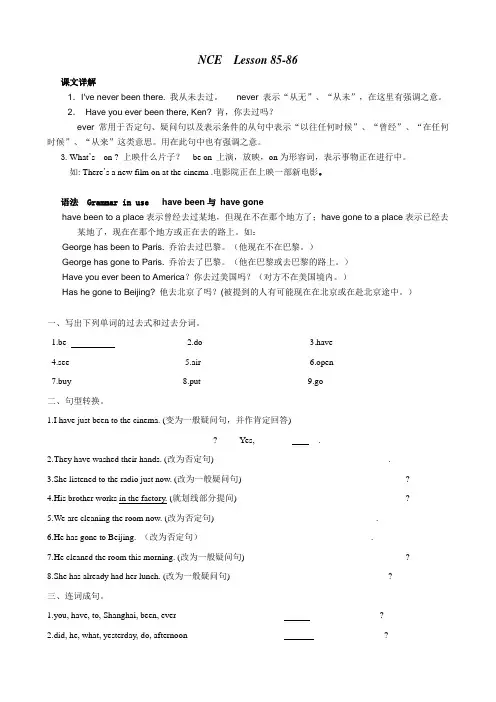
NCE Lesson 85-86课文详解1.I've never been there. 我从未去过。
never 表示“从无”、“从未”,在这里有强调之意。
2.Have you ever been there, Ken? 肯,你去过吗?ever常用于否定句、疑问句以及表示条件的从句中表示“以往任何时候”、“曾经”、“在任何时候”、“从来”这类意思。
用在此句中也有强调之意。
3.What’s on ? 上映什么片子?be on 上演,放映,on为形容词,表示事物正在进行中。
如: There’s a new film on at the cinema .电影院正在上映一部新电影。
语法 Grammar in use have been与have gonehave been to a place表示曾经去过某地,但现在不在那个地方了;have gone to a place表示已经去某地了,现在在那个地方或正在去的路上。
如:George has been to Paris. 乔治去过巴黎。
(他现在不在巴黎。
)George has gone to Paris. 乔治去了巴黎。
(他在巴黎或去巴黎的路上。
)Have you ever been to America?你去过美国吗?(对方不在美国境内。
)Has he gone to Beijing? 他去北京了吗?(被提到的人有可能现在在北京或在赴北京途中。
)一、写出下列单词的过去式和过去分词。
1.be __________2.do ___________ __________3.have ___________ __________4.see ___________ __________5.air ___________ __________6.open ___________ __________7.buy __________ __________ 8.put __________ __________ 9.go ________ ___________二、句型转换。
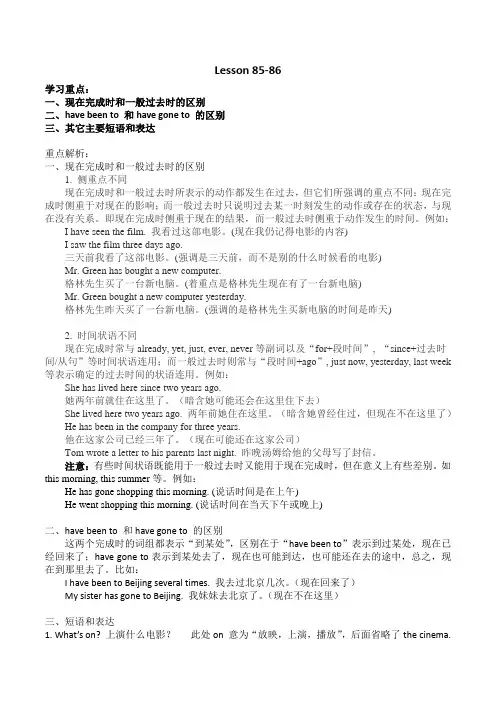
Lesson 85-86学习重点:一、现在完成时和一般过去时的区别二、have been to 和have gone to 的区别三、其它主要短语和表达重点解析:一、现在完成时和一般过去时的区别1. 侧重点不同现在完成时和一般过去时所表示的动作都发生在过去,但它们所强调的重点不同:现在完成时侧重于对现在的影响;而一般过去时只说明过去某一时刻发生的动作或存在的状态,与现在没有关系。
即现在完成时侧重于现在的结果,而一般过去时侧重于动作发生的时间。
例如:I have seen the film. 我看过这部电影。
(现在我仍记得电影的内容)I saw the film three days ago.三天前我看了这部电影。
(强调是三天前,而不是别的什么时候看的电影)Mr. Green has bought a new computer.格林先生买了一台新电脑。
(着重点是格林先生现在有了一台新电脑)Mr. Green bought a new computer yesterday.格林先生昨天买了一台新电脑。
(强调的是格林先生买新电脑的时间是昨天)2. 时间状语不同现在完成时常与already, yet, just, ever, never等副词以及“for+段时间”, “since+过去时间/从句”等时间状语连用;而一般过去时则常与“段时间+ago”, just now, yesterday, last week 等表示确定的过去时间的状语连用。
例如:She has lived here since two years ago.她两年前就住在这里了。
(暗含她可能还会在这里住下去)She lived here two years ago. 两年前她住在这里。
(暗含她曾经住过,但现在不在这里了)He has been in the company for three years.他在这家公司已经三年了。
(现在可能还在这家公司)Tom wrote a letter to his parents last night. 昨晚汤姆给他的父母写了封信。
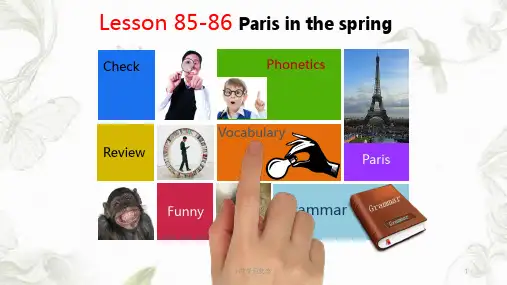
新概念英语第85-86课课文详解第一册新概念英语第85-86课课文详解(第一册)导语:巴黎是座美丽的城市,电影《巴黎之春》就是在那拍的,下面是一篇关于这方面的新概念英语课文,欢迎大家阅读。
Lesson 85 Paris in the spring巴黎之春Listen to the tape then answer this question.At what time of year did Ken visit Paris?听录音,然后回答问题。
肯是在什么季节访问巴黎的?George: Hello, Ken.乔治:你好,肯。
Ken: Hello, George.肯:你好,乔治。
George: Have you just been to the cinema?乔治:你刚去过电影院吗?Ken: Yes, I have.肯:是的,我刚去过。
George: What’s on?乔治:上映什么片子?Ken: “Paris in the Spring”.肯:《巴黎之春》。
George: Oh, I’ve already seen it.I saw it on television last year. It’s an old film, but it’s very good.乔治:噢,我已看过了。
我是去年在电视上看的。
这是老部片子,但很好。
Ken: Paris is a beautiful city.肯:巴黎是座美丽的城市。
George: I have never been there. Have you ever been there, Ken?乔治:我从未去过。
肯,你去过吗?Ken: Yes, I have. I was there in April.肯:是的,我去过。
4月份我在那儿。
George: Paris in the spring, eh?乔治:那是巴黎之春,是吗?Ken: It was spring, but the weather was awful. It rained all the time.肯:是春天,但天气太糟了。
新概念英语第85-86课课文详解第一册导语:巴黎是座美丽的城市,电影《巴黎之春》就是在那拍的,下面是一篇关于这方面的新概念英语课文,欢迎大家阅读。
Lesson 85 Paris in the spring巴黎之春Listen to the tape then answer this question.At what time of year did Ken visit Paris?听录音,然后回答问题。
肯是在什么季节访问巴黎的?George: Hello, Ken.乔治:你好,肯。
Ken: Hello, George.肯:你好,乔治。
George: Have you just been to the cinema?乔治:你刚去过电影院吗?Ken: Yes, I have.肯:是的.,我刚去过。
George: What’s on?乔治:上映什么片子?Ken: “Paris in the Spring”.肯:《巴黎之春》。
George: Oh, I’ve already seen it.I saw it on television last year. It’s an old film, but it’s very good.乔治:噢,我已看过了。
我是去年在电视上看的。
这是老部片子,但很好。
Ken: Paris is a beautiful city.肯:巴黎是座美丽的城市。
George: I have never been there. Have you ever been there, Ken?乔治:我从未去过。
肯,你去过吗?Ken: Yes, I have. I was there in April.肯:是的,我去过。
4月份我在那儿。
George: Paris in the spring, eh?乔治:那是巴黎之春,是吗?Ken: It was spring, but the weather was awful. It rained all the time.肯:是春天,但天气太糟了。